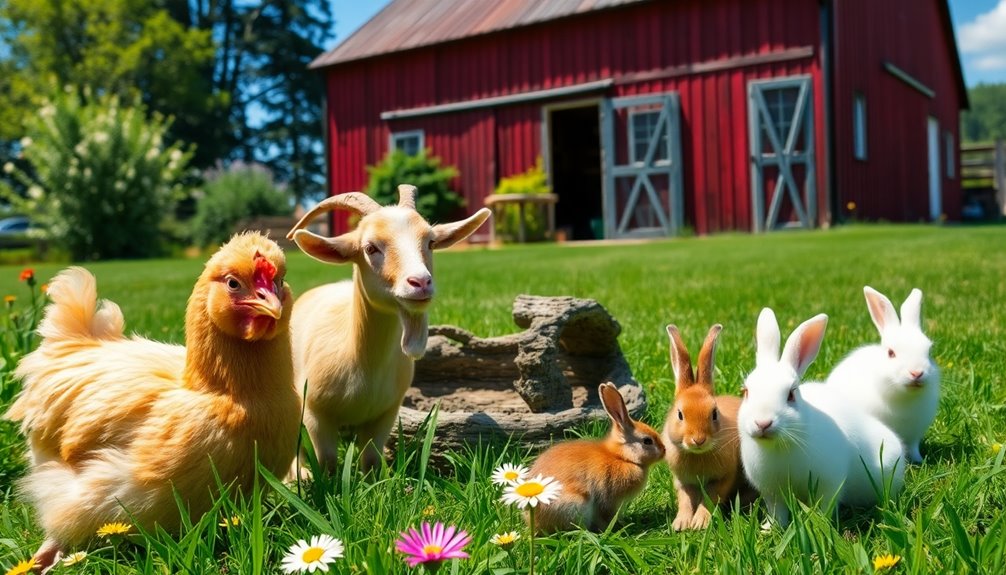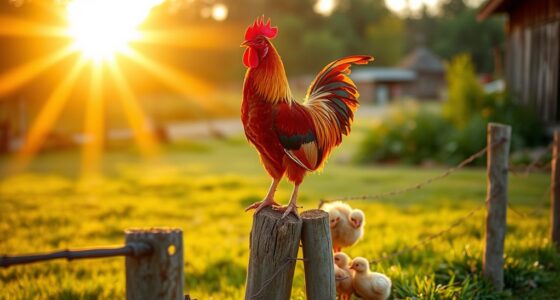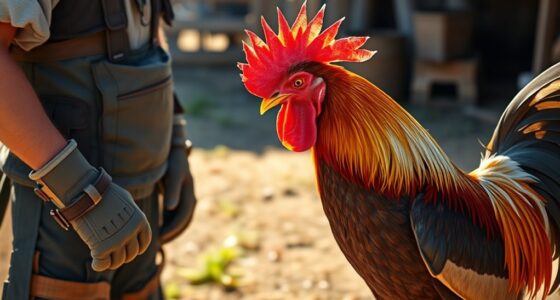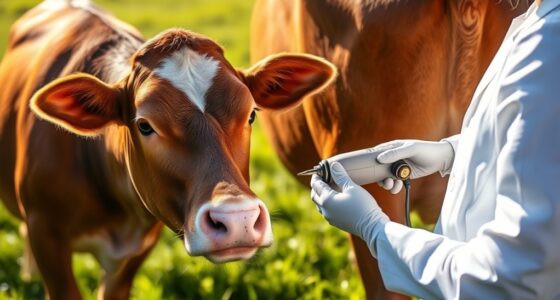Choosing the right backyard farm animals for your homestead starts with evaluating your needs and space. If you want eggs, chickens are perfect. For milk and companionship, consider Nigerian Dwarf goats. Sheep offer delicious meat and warm wool, while rabbits can be low-maintenance additions. Miniature cows bring gentle charm and require manageable care without much space. Each animal has unique benefits, so think about your family's dynamics and commitment level for their care. Understanding their needs and contributions helps you make informed choices. Stick around, and you'll discover more about how to get the best from your homesteading adventure.
Key Takeaways
- Assess your homestead's space and resources to determine suitable animals for egg production, meat supply, and companionship.
- Consider the specific care requirements and benefits of popular backyard animals like chickens, goats, and miniature cows.
- Evaluate family dynamics and work-from-home flexibility to ensure consistent animal care and attention.
- Research breeds that align with your needs, focusing on temperament, productivity, and compatibility with other livestock.
- Plan for long-term commitments, including daily feeding routines and veterinary care for your chosen animals.
Assessing Your Homestead Needs
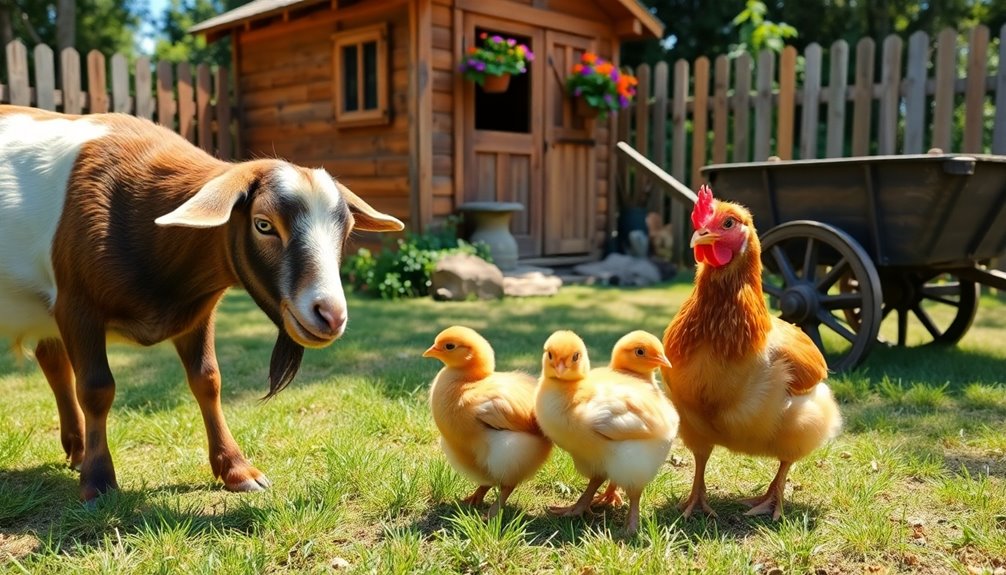
When contemplating adding backyard farm animals, it's crucial to first assess your homestead needs. Start by identifying the primary purposes for adding animals, whether it's for egg production, meat supply, pest control, or companionship.
Next, evaluate the available space on your homestead, including paddocks, barns, and necessary shelter, to determine what types and how many animals you can support.
Don't forget to reflect on your family members and their dynamics; think about your work-from-home flexibility and existing pet care responsibilities.
Finally, remember that keeping animals is a long-term commitment. Factor in the time required for daily feeding, health management, and veterinary visits to guarantee your homestead remains sustainable and thriving for years to come.
Popular Backyard Farm Animals
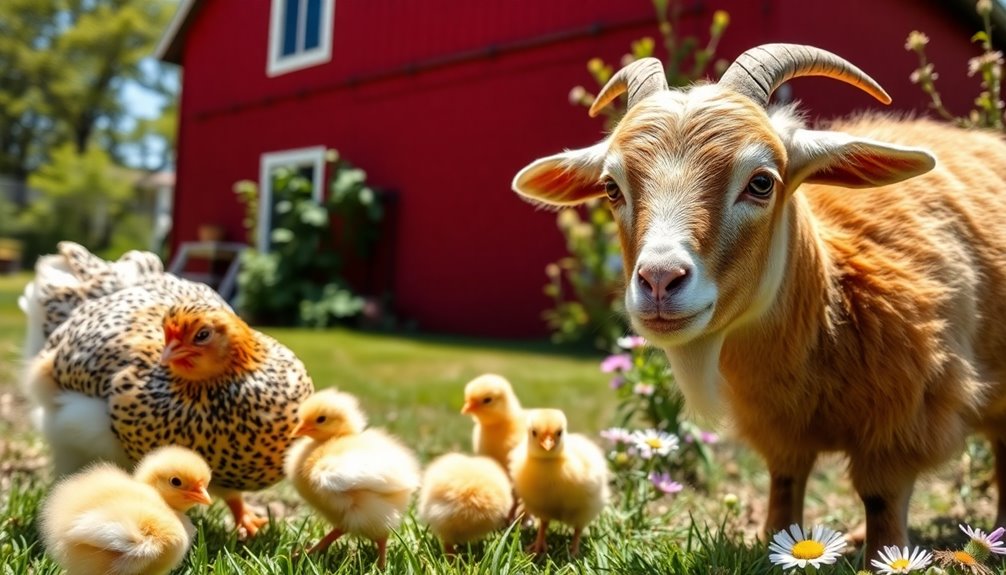
When it comes to popular backyard farm animals, chickens stand out as ideal poultry choices for their egg and meat production.
You might also consider versatile livestock options like goats and sheep, which not only provide milk and meat but also help maintain your land.
Don't forget about fun fiber animals like rabbits, offering both fur and a source of protein with minimal upkeep.
Ideal Poultry Choices
For those considering a backyard farm, choosing the right poultry can make all the difference in productivity and enjoyment.
Chickens are a fantastic choice, providing both eggs and meat; breeds like the Rhode Island Red can lay up to 300 eggs per year.
Ducks, such as the Pekin, excel at foraging and produce larger eggs while being less vulnerable to predators.
If you're interested in sustainability, heritage turkeys not only offer quality meat but also help preserve breed diversity.
Quail are perfect for smaller spaces, starting to lay eggs as early as 6-8 weeks, ensuring a steady protein source.
Each of these poultry options brings unique benefits, making your homestead vibrant and productive.
Versatile Livestock Options
Exploring versatile livestock options can elevate your backyard farm experience, providing a mix of productivity and enjoyment. Chickens, goats, and sheep are among the most popular farm animals, each offering unique benefits. Chickens provide eggs and meat while controlling pests, goats deliver milk, meat, and land maintenance, and sheep offer meat and wool.
Here's a quick comparison of these versatile animals:
| Animal | Products Offered |
|---|---|
| Chickens | Eggs, Meat, Pest Control |
| Goats | Milk, Meat, Land Maintenance |
| Sheep | Meat, Wool |
| Ducks | Eggs, Meat, Pest Control |
Adding rabbits can also diversify your farm, providing meat and fiber with minimal maintenance. Additionally, managing your finances effectively can ensure that you have the resources to invest in these financial health opportunities for a thriving homestead!
Fun Fiber Animals
Many backyard farmers find joy in raising fiber animals like alpacas and cashmere goats, which offer both companionship and valuable products.
Alpacas are gentle and have unique personalities, providing fleece that's softer and warmer than sheep wool.
On your small farm, cashmere goats, especially the Nigerian Dwarf breed, are prized for their fine cashmere fiber, which you can harvest annually.
This not only enhances your homestead's biodiversity but also adds economic value.
Fiber animals can coexist with other livestock, like sheep and chickens, while helping maintain your land through grazing.
Whether you sell their fiber or use it for personal crafting projects, these animals can provide an additional source of income and self-sufficiency.
Benefits of Raising Chickens
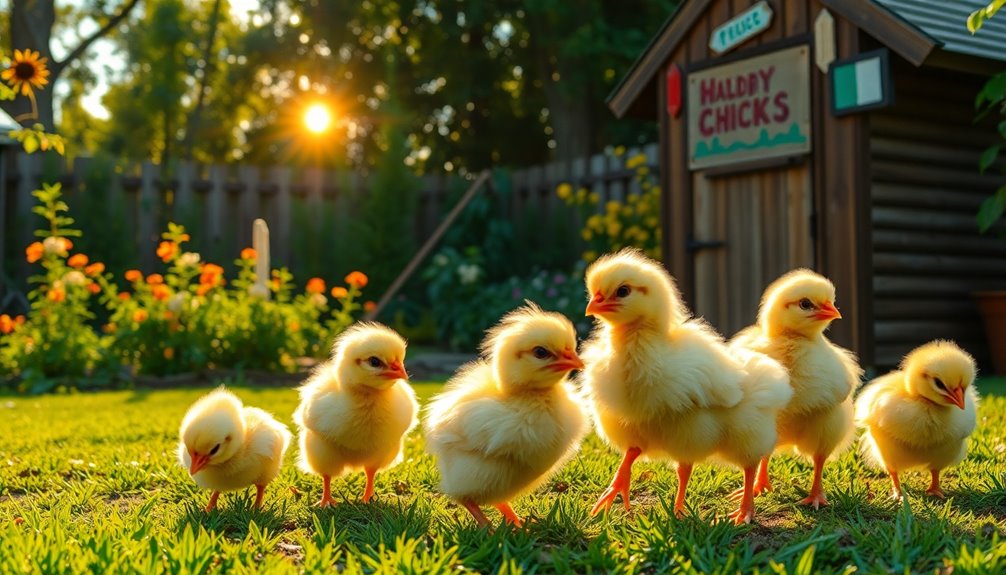
Raising chickens offers a multitude of benefits that can enhance your homesteading experience.
First and foremost, you'll enjoy a consistent source of fresh eggs, with each hen laying around 250 to 300 eggs a year, considerably cutting your grocery costs.
Chickens are also low-maintenance; they need a secure coop, fresh water, and a balanced diet to thrive, making them perfect for beginner homesteaders.
Additionally, they help control pests by foraging for insects and weeds, keeping your garden healthy. Their nutrient-rich manure enhances soil fertility, promoting healthier crops.
Beyond practical advantages, chickens provide companionship and valuable educational opportunities for families, teaching children about responsibility and care for living creatures. Furthermore, their ability to forage aligns with the principles of machine learning, as they adapt their behavior based on the environment and available resources.
The Joys of Goats
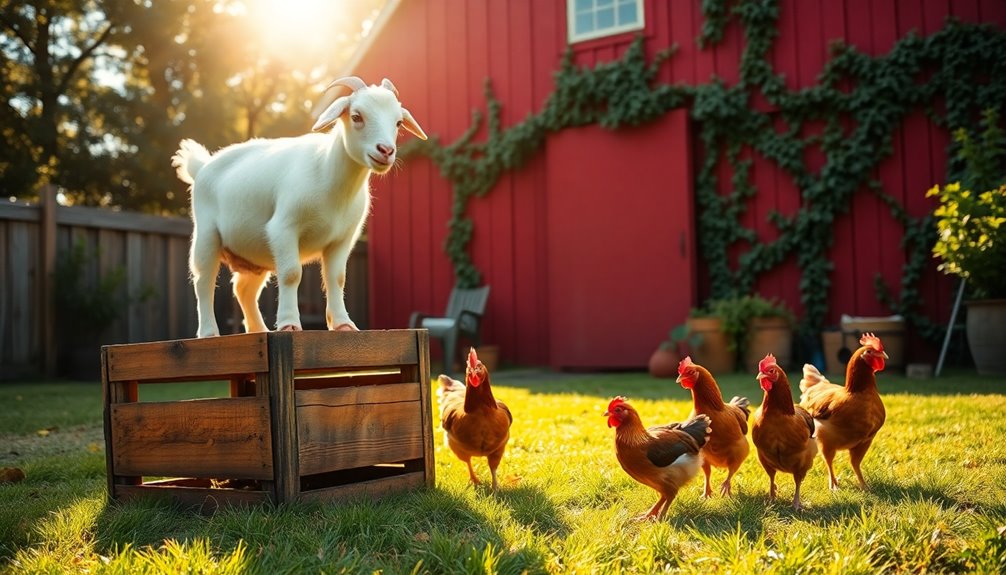
Bringing goats into your backyard can be a delightful experience that adds joy and utility to your homestead. These lively creatures are known for their engaging personalities, making them entertaining companions.
A small herd of Nigerian Dwarf goats is particularly beneficial, as they provide both milk and meat while being easier to manage than miniature cows. Goats also excel at land maintenance, effectively controlling unwanted vegetation like weeds and brush, which contributes to your farm's health.
With their relatively low feed requirements, they're a cost-effective choice for hobby farmers. Plus, goats are social animals that thrive in groups, enhancing their emotional well-being and creating opportunities for companionship—especially when paired with a loyal Great Pyrenees for protection. Additionally, raising goats can lead to substantial savings on your overall farm expenses, as they contribute to efficient land management and reduce the need for costly landscaping services.
Understanding Sheep Care
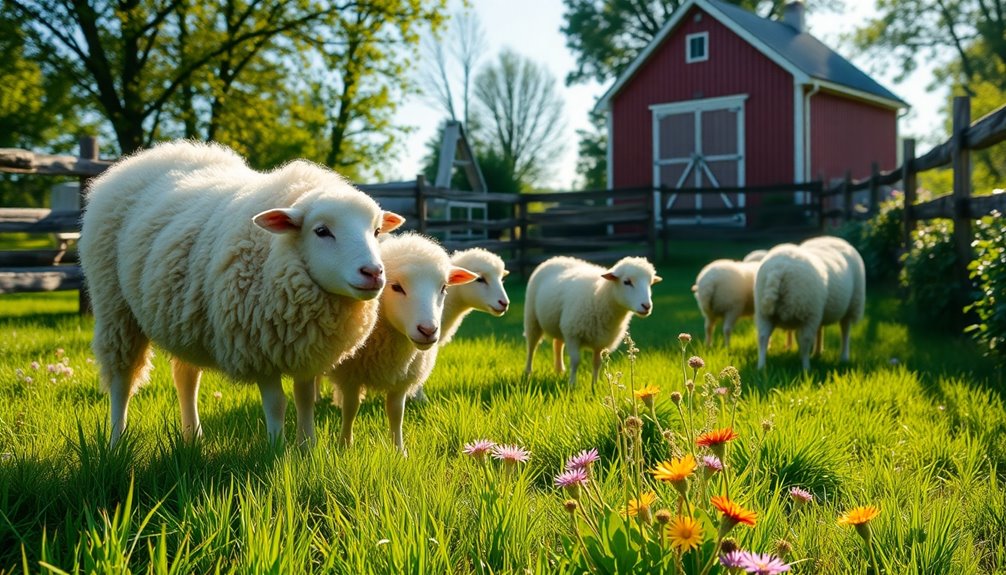
When you bring sheep onto your farm, understanding their basic requirements is key to keeping them healthy and happy.
Regular health checks, proper nutrition, and effective flock management practices are essential to guarantee your sheep thrive.
Basic Sheep Requirements
Two essential factors for understanding sheep care are their social needs and health requirements. Sheep thrive best in flocks, so it's important to keep at least two together to meet their social needs.
Maintaining their health involves regular care routines, including professional shearing to prevent overheating and guarantee wool quality, costing around six dollars per sheep. You also need to manage hoof trimming, which is easy and affordable.
Regular health checks, vaccinations, and parasite control are critical for preventing diseases. Additionally, provide a balanced diet of high-quality forage, with specific copper supplementation to support overall health.
Health and Nutrition
Maintaining ideal health and nutrition for your sheep is essential to their well-being and productivity. Regular health checks, including vaccinations and parasite management, help you catch any potential issues early.
Your sheep need a balanced diet rich in high-quality forage, grains, and minerals, especially copper, to prevent deficiencies. Don't forget routine hoof trimming every 6-8 weeks to avoid lameness, ensuring they can graze comfortably.
Annual shearing is also important to prevent overheating and skin infections, so budget for this service. Finally, providing clean, fresh water at all times is vital; dehydration can lead to serious health complications and hinder their growth and overall productivity. Additionally, consider incorporating high-quality protein sources into their diet to support overall health.
Prioritize these aspects for a thriving flock.
Flock Management Practices
Effective flock management practices are essential for ensuring your sheep remain healthy and productive.
Regular hoof trimming is critical in sheep care, preventing foot rot and maintaining their mobility. You should also schedule routine health checks, including vaccinations and parasite control, to keep your flock disease-free.
Nutrition plays an important role, so provide a balanced diet with fresh grass, hay, and necessary minerals, particularly copper supplementation.
Additionally, don't overlook the importance of social interaction; sheep thrive in groups, so consider keeping them with other livestock for companionship.
Finally, plan for regular shearing to avoid overheating and keep wool quality high, with professionals typically charging about six dollars per sheep.
Implementing these practices will promote a thriving flock on your homestead.
Miniature Cows for Small Spaces
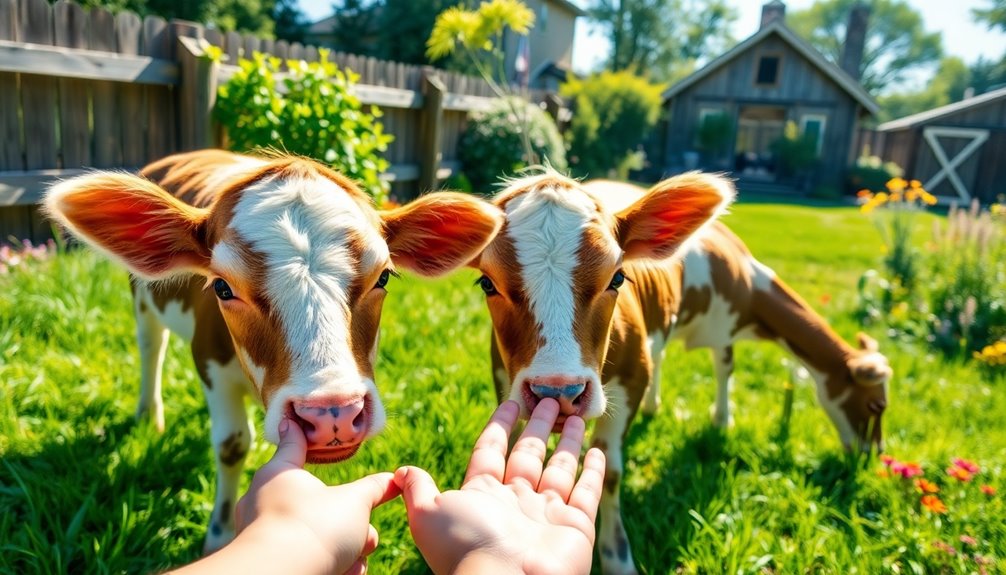
If you're looking to add a charming and practical touch to your small homestead, miniature cows might be the perfect solution. Breeds like the Miniature Hereford or Dexter typically weigh between 400 to 800 pounds, making them manageable for small spaces.
They require about one acre of pasture per cow, allowing you to efficiently graze without needing extensive land. Known for their gentle temperament, these cows are ideal companions, especially for families with children.
Plus, they can produce around 1 to 3 gallons of fresh milk daily, giving you a steady supply without the demands of larger breeds. Their size also makes routine care easier, enhancing your overall farming experience on your small homestead.
Exploring Pigs as Pets
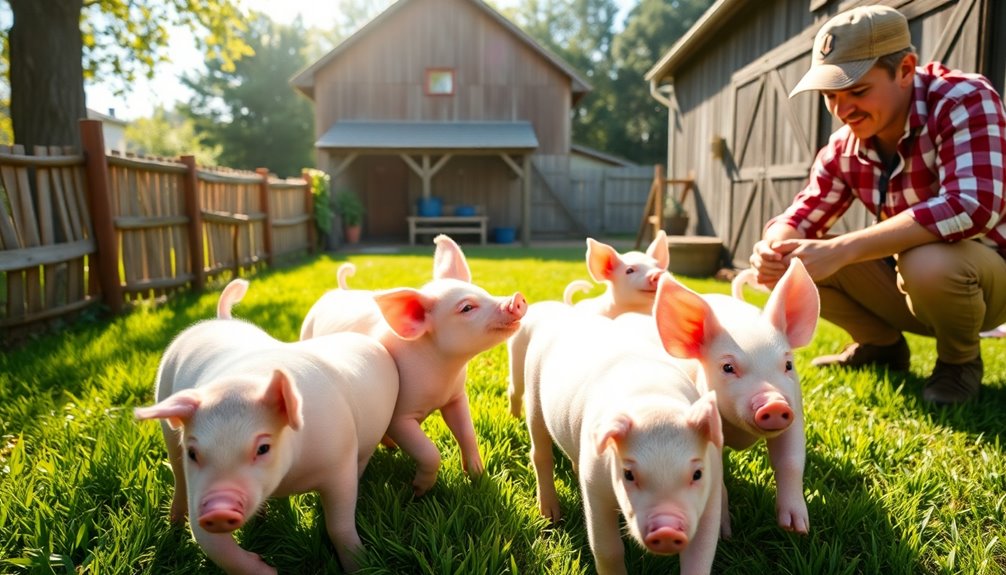
Considering pigs as pets can be an exciting journey into the world of intelligent and social animals. Pigs, especially KuneKune pigs, are known for their affectionate nature and friendly disposition, making them great companions for families.
Proper socialization is vital, as piglets thrive in pairs or groups to avoid loneliness and behavioral issues. They're not just adorable; pigs are also efficient foragers, utilizing kitchen scraps and leftover food, which contributes to waste management on your homestead.
While they can be playful and entertaining, it's important to provide secure fencing to keep them safe from predators and prevent wandering. Engaging with pigs can also enhance social interactions among peers, as children can learn valuable lessons about empathy and responsibility through caring for animals.
Embracing pigs as pets can bring joy and practicality to your backyard farm.
The Case for Alpacas
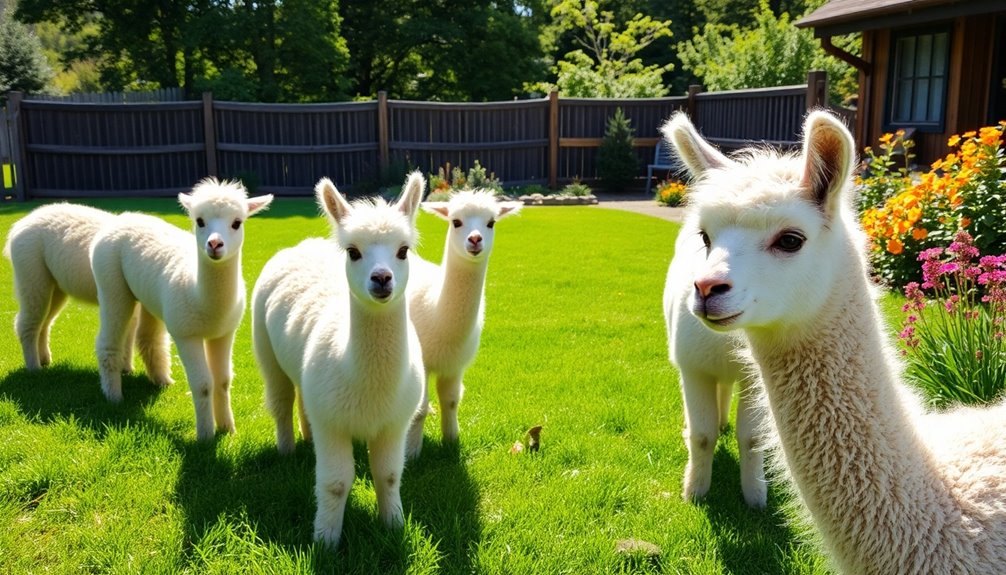
Discovering the charm of alpacas can enrich your homesteading experience. These gentle and friendly animals make excellent companions for families. Alpacas are low-maintenance, requiring minimal grooming while providing luxurious, hypoallergenic fiber in various natural colors. Their waste serves as an organic fertilizer, enhancing your sustainable farming practices.
Since they're social creatures, keeping them in pairs or small groups promotes better behavior and health. Additionally, alpacas are effective grazers that help maintain pastures by controlling unwanted vegetation.
Here's a quick comparison of their benefits:
| Feature | Description | Benefit |
|---|---|---|
| Fiber | Luxurious, hypoallergenic | Great for textiles |
| Maintenance | Low-maintenance, minimal grooming | Saves time and effort |
| Social Behavior | Thrive in pairs or groups | Healthier and happier |
| Waste | Excellent organic fertilizer | Promotes sustainable farming |
| Grazing | Effective at pasture management | Controls unwanted plants |
Making the Right Choice
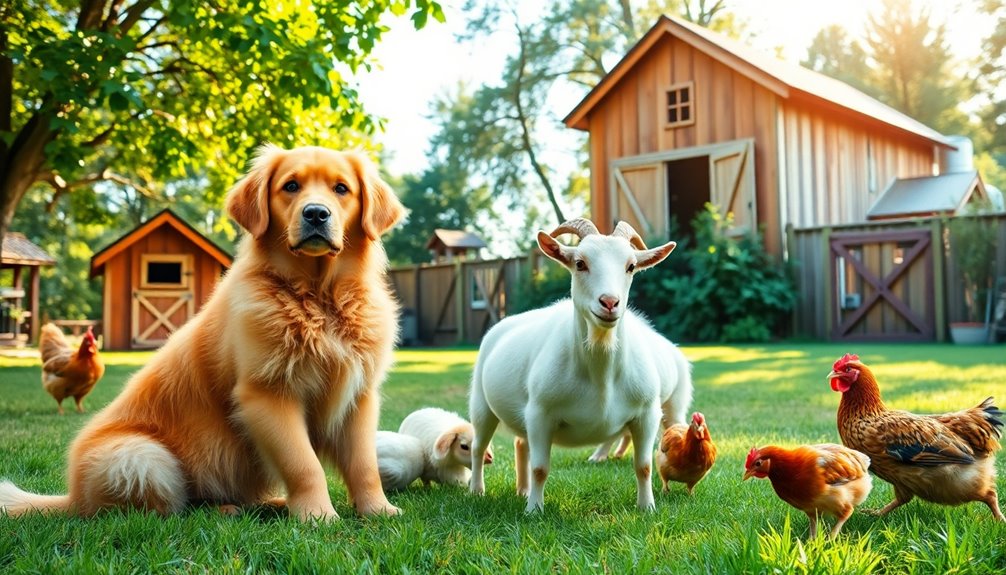
Choosing the right backyard farm animals hinges on your specific goals and lifestyle. If you're focused on egg production, chickens are often your best bet due to their high utility and low maintenance.
For those interested in milk or meat, consider one of the many goat breeds, like Nigerian Dwarfs, known for their friendly nature and rich milk. Goats do require secure fencing, so plan accordingly.
If you prefer small animals, sheep can be a great option, as they tend to be less adventurous and coexist well with other livestock.
Always research specific breeds to verify they meet your needs, and don't forget to plan for long-term care, making sure you can handle veterinary needs and grooming.
Frequently Asked Questions
What Farm Animal Makes the Best Pet?
When you're considering what farm animal makes the best pet, it really depends on your lifestyle and preferences.
Chickens can provide fresh eggs and help control pests, while goats offer companionship and assist with land maintenance.
If you're looking for a low-maintenance option, sheep might be your best bet.
Miniature pigs are social and affectionate, but they need proper socialization.
Rabbits are fun, easy to care for, and offer meat and fur.
Choose what suits you best!
What Is the Best Animal to Start a Homestead?
When you're starting a homestead, chickens are often your best bet. They provide a steady supply of eggs and meat while being relatively easy to care for.
Goats also make a fantastic choice; they offer milk and help manage weeds with their browsing habits.
If you're looking for companionship and wool, consider sheep. These animals will help you establish a productive and rewarding homestead right from the start.
What Is the Easiest Animal to Take Care of on a Farm?
They say, "The early bird catches the worm," and when it comes to farm animals, chickens are a top choice for ease.
You'll find they require minimal space and straightforward feeding, while giving you fresh eggs.
Goats are another great option since they thrive on various forage and can help manage your land.
If you're looking for friendly companions, sheep or rabbits might suit you, too, as they're both low-maintenance and rewarding.
What Is the Best Animal to Raise in Your Backyard?
When you're thinking about the best animal to raise in your backyard, consider your space, needs, and preferences.
Chickens are a fantastic choice, offering fresh eggs and pest control with minimal upkeep.
If you're looking for something playful, Nigerian Dwarf goats provide milk and companionship.
For wool and meat, Katahdin sheep are easy to manage.
Whatever you choose, make certain it fits your lifestyle and brings joy to your backyard experience!
Conclusion
Imagine your backyard as a vibrant garden, each animal a colorful flower blooming with joy and purpose. By choosing the right pets for your homestead, you cultivate not just a sustainable source of food but also a nurturing environment filled with laughter and companionship. Whether it's the cluck of chickens or the gentle baa of sheep, each creature adds its unique hue to your life's tapestry. Embrace your role as a gardener of happiness and make your choice wisely!

